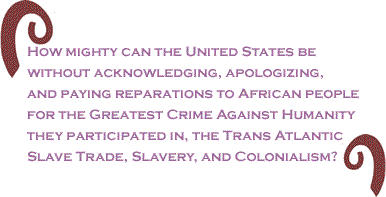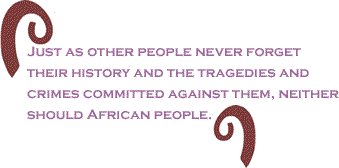
|
|||||||||||||||||||||||

|
|

Custom Search
|
|
 |
|
| It is important to view the current United States threat to not participate in the Durban Review Conference at the United Nations in April of this year in the historical context of their efforts to stop the truth from being included in the “Durban Declaration” of September 2001. The following is what I wrote about the behavior of the United States in 2001, which continues today. The Durban 400 was made up of the December 12th Movement International Secretariat and the National Black United Front (NBUF) that were leading participants in the United Nations World Conference Against Racism (WCAR) that was held in Durban, South Africa from August 31st through September 7, 2001. Because the United States did not agree with many of the issues being raised at this conference, particularly, the push by African people worldwide to declare that the Trans Atlantic Slave Trade and Slavery are a Crime Against Humanity and that Reparations are owed to African people in the Diaspora and on the continent of Africa, the United States withdrew their low level delegation and left only the Ambassador to South Africa to represent them. The role of the United States and Western Europe (WEO) to subvert the agenda “provided the indisputable proof” that the issues we fought for, to be included in the Durban Declaration, went to the “heart of the World Conference Against Racism.” For over two years, representatives from the Durban 400 traveled throughout the world attending the various preparatory meetings for the WCAR, advocating our agenda that was simple and focused: 1) Declaration of the Trans Atlantic Slave Trade, Slavery, and Colonialism as Crimes Against Humanity; 2) Reparations for African people on the continent and in the Diaspora; 3) Recognition of the Economic Base of Racism. As the (Non Governmental Organization) International Association Against Torture pointed out in their intervention at the WCAR, “From the beginning they were clear (The U.S. and the WEO Group) that a conference which addressed racism and racial discrimination could only have one outcome— to subject them to the same human rights standards which they imperiously demand that the developing world uncomplainingly submit to and to identify them as perpetrators of history’s greatest crime against humanity, the Trans Atlantic Slave Trade and Slavery.”
One of the supporters of the Durban 400 wrote me the following reflections shortly after the 9-11 attacks that I think are still timely for the events currently occurring in the United States. The reflections read as follows:
I
will add, “How mighty can the United States be without acknowledging,
apologizing, and paying reparations to African people As researched by the UNESCO Slave Trade Project, the Museum of the Atlantic Slave Trade, and the Harvard Database on Slave Voyages, twenty-eight to forty-two million African people were captured and enslaved between 1441 and 1888… Four to six million Africans, 40% of all captives and slaves, were murdered or died along the entire “way of death…” Just as other people never forget their history and the tragedies and crimes committed against them, neither should African people. Therefore, the Durban 400 declared a victory in contributing to the final outcome of the Durban Declaration that reflects the interests of African people by citing:
BlackCommentator.com Columnist, Conrad W. Worrill, PhD, is the National Chairman of the National Black United Front (NBUF). Click here to contact Dr. Worrill. |
|
Any BlackCommentator.com article may be re-printed so long as it is re-printed in its entirety and full credit given to the author and www.BlackCommentator.com. If the re-print is on the Internet we additionally request a link back to the original piece on our Website. Your comments are always welcome. eMail re-print notice
If you send us an eMail message we may publish all or part of it, unless you tell us it is not for publication. You may also request that we withhold your name. Thank you very much for your readership. |
|
| |
|
| April
9 , 2009 Issue 319 |
|
| Executive Editor: Bill Fletcher, Jr. |
| Managing Editor: Nancy Littlefield |
| Publisher: Peter Gamble |
| Est. April 5, 2002 |
Printer Friendly Version
in resizeable plain
text format or pdf
format. |
| Frequently Asked Questions |
 |

|
 |
 |
 |
| |
| |




































